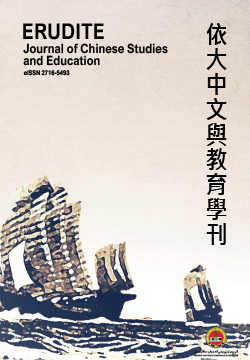“华”“拉”之变:〈龙吐珠〉及梁放的族群书写
Ethnic and Cultural Changeability: On Liang Fang’s “Long Tuzhu” and his Ethnic Writing
DOI:
https://doi.org/10.37134/erudite.vol2.1.1.2021Keywords:
梁放, 马华文学, 华夷, 族群书写Abstract
梁放,原名梁光明,1953年出生于英属砂拉越的砂拉卓,被誉为“砂拉越最主要的‘在地代表’”,曾获第十四届马华文学奖。梁放最常被收入马华文集的篇章乃小说〈龙吐珠〉,与李永平名篇〈拉子妇〉主题相似,〈龙吐珠〉也处理华族男子对原住民女子的始乱终弃。但如过去论者所点出的,以受害者视角书写的〈龙吐珠〉比后者更为深刻和有张力。故此,本文有意以〈龙吐珠〉为中心,兼及梁放其他涉及族群书写的作品,探讨其族群思想,亦即他如何表现或问题化族群?又提供怎样的族群想象和思考?在此,王德威的华夷论述可为本文所借镜和对话。“华夷之变”强调时间与空间变动中文学所展现的华夷关系之“广袤流动空间”。〈龙吐珠〉一文呈现的正是主人翁半“华”半“拉(子)”的身分、驱“拉”入“华”的举措及“华—拉”不分的追求,与“华夷之变”的关怀有一定的呼应。然而,“华夷之变”说并未具体说明“变”如何发生,本文将透过〈龙吐珠〉和梁放其他小说的分析补充相关思考:文本强调正面积极的族群认同感,并尝试以“情”松动“华╱拉”界限。但,华—拉之“变”到底有其困难,梁放的族群思想与书写也有其限制,本文将在最后简单评述。
Liang Fang 梁放 was born in 1953 in Saratok, British Borneo. He is known as “the most important local representative of Sinophone Sarawak writer” and won the 14th Sinophone Malaysian Literature Award. Liang's most frequently anthologized work is the short story “Long Tuzhu龙吐珠”, which is similar to the famous short story “Lazi Fu 拉子妇” by Li Yongping李永平as it is also about an unscrupulous Chinese man who ends up abandoning an indigenous woman. However, as past critics have pointed out, “Long Tuzhu”, written from the perspective of the victim, is more profound and has more tension compared with “Lazi Fu”. This article focuses on "Long Tuzhu", while also discussing Liang's other works, to analyse his ethnic thought: How does Liang write or problematise ethnic? What kind of ethnic imagination and thinking does he provide? Sinophone/Xenophone Studies,which highlights ethnic and cultural alterity and changeability, can be used to analyses “Long Tuzhu”, as it is about the identity problem of a mixed blood protagonist. However, Sinophone/Xenophone Studies does not concretely describe how this change happens; this article will argue it with a close reading of “Long Tuzhu” and Liang's other works which emphasizes the positive sense of racial identity and the power of sentiment. Lastly, this article briefly comments on the difficulties of ethnic changeability and the limitations inherent in Liang’s ethnic thinking and writing.
Keywords: Liang Fang, Sinophone Malaysian literature, Sinophone/Xenophone, ethnic writing
Downloads
References
【征引文献】
一、中文著作
王德威、高嘉谦、胡金伦编,《华夷风:华语语系文学读本》,台北:联经,2016。
王赓武著、姚南编,《东南亚与华人》,北京:中国友谊出版社,1986。
田英成,《砂拉越华人社会史研究》,诗巫:砂拉越华族文化协会,2011。
林青青,《砂拉越伊班族的民俗、说唱艺术及其华族文化色彩》,诗巫:砂拉越华族文化协会,2005。
许文荣和孙彦庄主编,《马华文学文本解读》,吉隆坡:马大中文系毕业生协会、马大中文系,2012。
〔美〕阿马蒂亚·森(Amartya Sen)著,李风华等译,《身份与暴力:命运的幻象》,北京:中国人民大学出版社,2009。
〔美〕玛莎·纳思邦(Martha C. Nussbaum)著、尧嘉宁译,《从恶心到同理:拒斥人性,还是站稳理性?法哲学泰斗以宪法观点重探性倾向与同性婚姻》,台北:麦田,2018。
周丹尼著、黄顺柳译,《砂朥越报道越乡镇华人先驱》,古晋:黄顺柳出版,1990。
钟怡雯、陈大为编,《犀鸟卷宗:砂拉越华文文学研究论集》,桃园:元智大学中语系,2016。
梁放,《腊月斜阳:梁放小说自选集》,八打灵再也:有人出版社与马来西亚华文作家协会,2018。
梁放,《我曾听到你在风中哭泣》,加影:貘出版社,2014。
梁放,《远山梦回》,北京:文化艺术出版社,2002。
梁放,《烟雨砂隆》,古晋:婆罗洲出版有限公司,1989。
黄锦树,《马华文学批评大系:黄锦树》,桃园:元智大学中语系,2019。
黄锦树,《马华文学:在中国、语言与文学史》,吉隆坡:华社资料研究中心,1996。
蔡增聪主编,《砂拉越华人研究译文集》,诗巫:砂拉越华族文化协会,2003。
颜清煌著、李恩涵译,《星马华人与辛亥革命》,台北:联经,1982。
二、期刊论文
王德威,〈华夷之变:华语语系研究的新视界〉,《中国现代文学》总第34期(2018年12月),页1-27。
李淑君,〈从“她族”映照“中国性”:从〈红纱笼〉到〈拉子妇〉的道德优越到自我赎罪〉,《台东大学人文学报》第6卷第1期(2016年6月),页123-152。
刘青峰、金观涛,〈19世纪中日韩的天下观及甲午战争的爆发〉,《思想》总第3期(2006年12月),页106-128。
张锦忠,〈记忆、创伤与李永平小说里的历史——重读《婆罗洲之子》与《拉子妇》〉,《扬子江评论》总第5期(2013年10月),页30-35。
高嘉谦,〈谁的南洋?谁的中国?——试论《拉子妇》的女性与书写位置〉,《中外文学》第29卷第4期(2000年9月),页139-154。
黄锦树,〈南方华文文学共和国:一个刍议〉,《中山人文学报》总第45期(2018年7月),页1-20。
三、英文文献
Shu-mei Shih, Chien-hsin Tsai and Brian Bernards ed., Sinophone Studies: A Critical Reader, New York: Columbia University Press, 2013.





